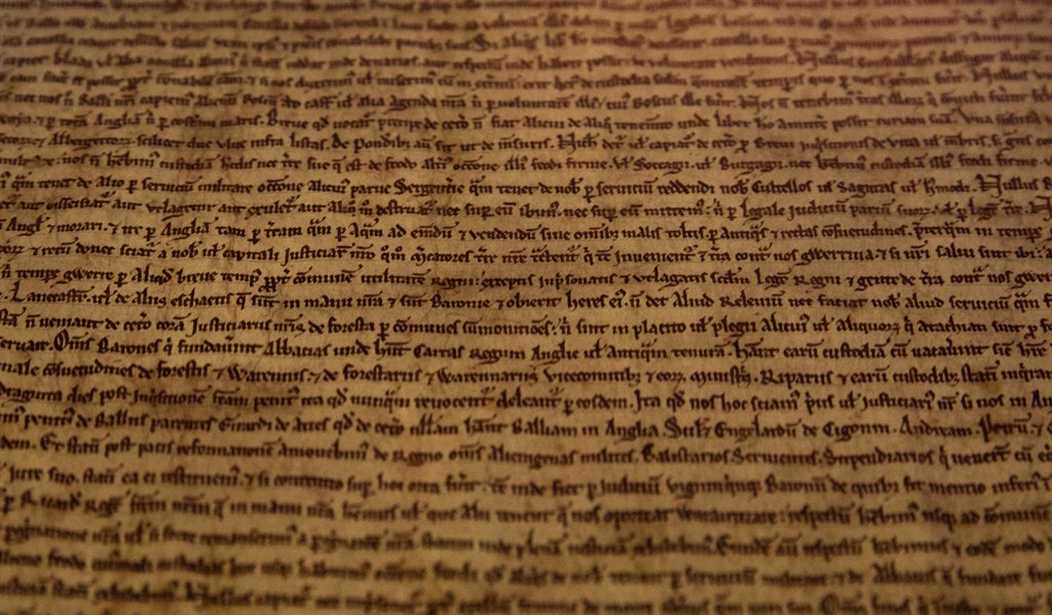Exactly 800 years after the signing of the Magna Carta on June 15, 1215, the church/state question is still very much front-page news.
That’s because the Left’s ongoing hostility to religious freedom and its pursuit of a radically secular agenda keeps bumping up against principled opposition. If those pesky religious types would just go away, the Left could get on with building a heaven on earth, where enlightened ruling elites manage the masses.
But resistance continues. Cases in point are the Catholic and Protestant defiance of the Obamacare abortifacient mandate, and this past week’s promise of civil disobedience by dozens of conservative religious leaders against any Supreme Court ruling “which will force us to violate a clear biblical understanding of marriage solely as the union of one man and one woman.”
As the signers of the Open Letter to the Supreme Court remind the justices, who will shortly rule in Obergefell v. Hodges: “Any judicial opinion which purports to redefine marriage will constitute an unjust law, as Martin Luther King, Jr. described such laws in his letter from the Birmingham Jail.”
But where did the idea of “unjust” laws, liberty and limitations on the state arise?
The popular view taught in public schools, by an aggressively secular media, and even by liberal churchmen, has been that human freedom arrived with the Renaissance, after the Roman Empire collapsed in the Fifth Century A.D. and after another thousand dark years of Christendom.
In fact, medieval times in Europe were dubbed ”the Dark Ages,” as if no civilizing light was permitted to shine. It’s been a massive libel against an entire age.
It was in the so-called Dark Ages that the torch of liberty was lit, and it burned into the conflagration that forced King John to sign the Magna Carta at Runnymede, England. The Magna Carta is the grandfather to America’s Constitution and every other government-limiting compact, and it’s based on Christian-informed medieval concepts of “Deity, nature, man and government,” as noted by the late M. Stanton Evans in his remarkable book, The Theme Is Freedom.
Recommended
The eight-centuries-old document did a number of things beyond freeing the feudal lords from the king’s claim to absolute power.
“Magna Carta is a lengthy catalogue of safeguards against the abuse of power, guarantees of religious liberties, legal rights, taxation by consent, and so on,” Evans writes. “These form the basis of much of what was embodied in the Common Law, by which the liberties of Englishmen (and Americans) were tenaciously defended.”
Far from being a secular product, the Magna Carta was inspired largely by Archbishop Stephen Langton, who subscribed to Jesus’ famous “render unto Caesar” limitation on state power and took a dim view of Lex Regis – absolute rule by the king.
We’re often reminded that democracy originated in Greece – a pagan society pre-dating Jesus.
The Greeks certainly contributed to the Western concept of self-government, but, “contrary to the standard history … the pagan world was not even close to understanding our approach to freedom,” Evans writes. “The era in which these notions were assembled into the edifice of freedom was, precisely, the Middle Ages,” whose “foremost political concept” was “constitutionalism – establishing limits on the power of kings, and on the scope of government in general.”
King George III, like other royals during and just after the Renaissance, had violated the American colonists’ rights as Englishmen as established by the Magna Carta and expanded through the Common Law’s constitutionalism.
America’s revolution, as explained by Thomas Jefferson in the Declaration of Independence, was an effort to reestablish “the laws of Nature and Nature’s God” against the whims of an absolute ruler.
By contrast, the French Revolution, the fountainhead of socialism, communism and state primacy, was founded on atheism. It ended with guillotines and blood in the streets as the revolution eventually ate even its own.
Today’s cultural conceit is that we’re somehow past all this, and that arguments over Obamacare, executive power and “gay marriage” are just speed bumps on the way to an evolving society of equality, led by our cultural betters. If religion gets in the way, well, something’s got to give.
Long before the Rev. King wrote his famous jail epistle, the great British jurist William Blackstone plainly outlined the two kingdoms in conflict – and which should prevail:
"This law of nature … dictated by God himself, is of course superior in obligation to any other. It is binding over all the globe, in all countries, and at all times: no human laws are of any validity, if contrary to this.”
The Supreme Court justices would do well to ponder this, as expressed in a more contemporary fashion by Clint Eastwood’s “Dirty Harry”:
“A man’s got to know his limitations.”

























Join the conversation as a VIP Member